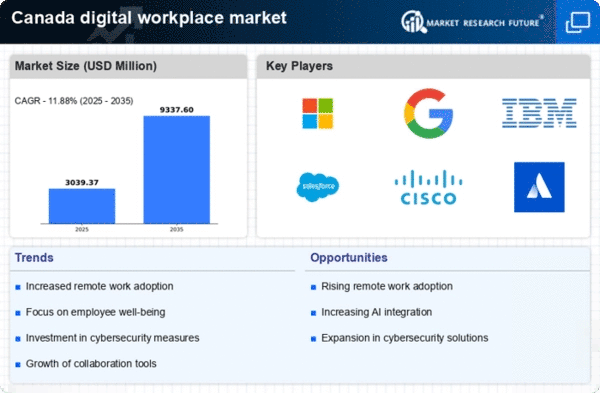Emphasis on Data Security and Compliance
In the digital workplace market, the emphasis on data security and compliance is becoming increasingly critical for Canadian organizations. With the rise of remote work, companies face heightened risks related to data breaches and cyber threats. As a result, organizations are investing in advanced cybersecurity measures to protect sensitive information. According to industry reports, 60% of Canadian businesses have increased their cybersecurity budgets in response to these challenges. Compliance with regulations such as the Personal Information Protection and Electronic Documents Act (PIPEDA) further drives the need for robust security protocols. Companies are adopting comprehensive security frameworks and employee training programs to mitigate risks associated with remote work. This focus on data security not only safeguards organizational assets but also enhances trust among clients and stakeholders, thereby strengthening the overall position of businesses within the digital workplace market.
Growing Demand for Flexible Work Arrangements
The digital workplace market in Canada is witnessing a growing demand for flexible work arrangements. This shift is largely influenced by employees' desire for a better work-life balance and the need for organizations to adapt to changing workforce expectations. A recent survey indicates that 78% of Canadian employees prefer hybrid work models, which combine remote and in-office work. This trend compels companies to invest in technologies that support flexible work environments, such as virtual collaboration platforms and secure remote access solutions. As businesses strive to accommodate these preferences, they are likely to enhance their digital workplace strategies, ensuring that employees can work efficiently from various locations. This evolving landscape presents opportunities for growth within the digital workplace market, as organizations seek to implement solutions that cater to diverse working styles and preferences.
Technological Advancements in Collaboration Tools
The digital workplace market in Canada is experiencing a surge due to rapid technological advancements in collaboration tools. These innovations facilitate seamless communication and project management among remote teams. As organizations increasingly adopt cloud-based solutions, the market is projected to grow at a CAGR of 12.5% from 2025 to 2030. Enhanced functionalities such as real-time editing, video conferencing, and integrated task management systems are becoming essential for businesses aiming to improve productivity. The demand for user-friendly interfaces and mobile accessibility further drives this trend, as employees seek flexibility in their work environments. Consequently, companies are investing heavily in these technologies to remain competitive in the digital workplace market, ensuring that they can attract and retain top talent in an evolving landscape.
Increased Focus on Employee Training and Development
In the context of the digital workplace market, Canadian organizations are placing a heightened emphasis on employee training and development. This focus is driven by the need to equip employees with the necessary skills to navigate new technologies and tools effectively. According to recent data, companies that invest in employee training see a 24% increase in productivity. As the digital landscape evolves, continuous learning becomes crucial for maintaining a competitive edge. Organizations are increasingly adopting Learning Management Systems (LMS) to facilitate ongoing education and skill enhancement. This trend not only boosts employee engagement but also contributes to a more agile workforce, capable of adapting to the demands of the digital workplace market. As a result, businesses are likely to allocate more resources towards training initiatives, recognizing their importance in fostering a skilled and adaptable workforce.
Integration of Artificial Intelligence in Workplace Solutions
The integration of artificial intelligence (AI) in workplace solutions is emerging as a pivotal driver in the digital workplace market in Canada. AI technologies are being utilized to streamline processes, enhance decision-making, and improve overall efficiency. For instance, AI-powered chatbots are increasingly deployed to assist employees with routine inquiries, thereby freeing up valuable time for more strategic tasks. Furthermore, predictive analytics tools are being adopted to optimize resource allocation and project management. As organizations recognize the potential of AI to transform their operations, investments in these technologies are expected to rise significantly. A recent study suggests that companies leveraging AI in their digital workplace strategies could see productivity gains of up to 30%. This trend indicates a shift towards more intelligent and responsive workplace environments, positioning businesses favorably within the competitive landscape of the digital workplace market.
















